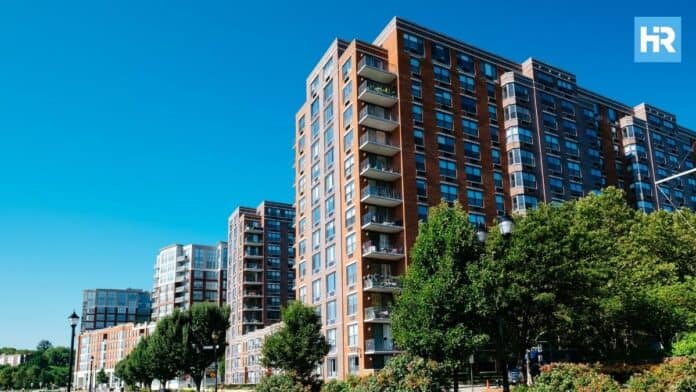Three major U.S. landlords challenge Hoboken and Jersey City over rent control laws, sparking a legal battle with housing affordability and tenant rights implications.
[su_box title=”Key Takeaways” box_color=”#003F81″ title_color=”#ffffff” radius=”9″]
- Three of the largest U.S. landlords have filed lawsuits against Hoboken and Jersey City, arguing that rent control laws are unconstitutional.
- With rent hikes reaching up to 30%, local officials argue such increases may violate state laws against “unconscionable and unreasonable” rent raises.
- The disputes also delve into the technicalities of exemptions from rent control for buildings constructed after 1987, highlighting issues with compliance and documentation.
[/su_box]
Corporate Landlords File Lawsuits
In a significant legal confrontation, 3 of America’s largest landlords have initiated lawsuits against Hoboken and Jersey City, challenging the enforcement of rent control laws. This legal action follows warnings from local authorities that rent increases exceeding 20% might contravene state and local regulations.
Legal Challenges to Rent Control
The controversy began when The Jordan’s equity company in Hoboken filed a lawsuit in early January, arguing that the application of local rent control constitutes an unconstitutional appropriation of private property. Following suit, Equity Residential and AvalonBay have also filed lawsuits against Hoboken and Jersey City, arguing these ordinances violate the U.S. Constitution.
The Root of the Dispute
The disputes revolve around recent rent hikes, with some landlords imposing increases as high as 30%. These actions have raised questions about compliance with a state housing law that deems “unconscionable and unreasonable” rent escalations illegal. Although the law does not specify a cap, precedents suggest that increases of around 25% could be considered excessive under certain circumstances.
In cities where median rents have climbed above $4,000 monthly, local rent control laws cap increases to match the cost of living adjustments. The enforcement of these laws has become a point of contention as the influx of younger populations post-pandemic raises questions about the legality of substantial rent increases.
Technicalities and Exemptions
A significant aspect of the legal battle involves technicalities related to exemptions from local rent control for buildings constructed after 1987, which are eligible for a 30-year state exemption. However, landlords must comply with certain regulations to maintain these exemptions, including notifying tenants about the rent control status upon moving in.
Some landlords claim they have been unfairly treated, citing instances where they were either not notified in time about rent control hearings or discovered that previous owners failed to secure exemptions correctly.
Individual Lawsuits and Statements
Each lawsuit presents unique arguments and circumstances. For example, The Jordan’s lawsuit highlights a dispute over whether the building should be subject to rent control, given alleged procedural oversights by the city’s Rent Leveling Office and Rent Leveling and Stabilization Board.
On the other hand, AvalonBay’s lawsuit challenges the city’s threat of imposing significant fines for non-compliance with rent control laws. This legal action also hints at political motivations, suggesting the timing of the lawsuit might be linked to the mayor’s political aspirations.
Equity Residential’s legal challenge involves its properties in both Hoboken and Jersey City, focusing on compliance with rent control regulations and the complexities of proving exemption status.
Wider Implications and Community Responses
These lawsuits highlight the growing tensions between large corporate landlords and local communities over housing affordability and tenant protections. The outcomes of these cases could significantly impact the rental housing regulation, tenant rights, and the affordability of housing in New Jersey and potentially across the nation.








![Best Jersey City Restaurants [current_date format=’Y’]: Which NJ Restaurants Live Up to the Hype?](https://staging.hudsonreporter.com/wp-content/uploads/2024/06/Jersey-City-Restaurants-324x160.jpg)



![Best Bitcoin Casinos in [current_date format=’Y’] – Top 10 Crypto Casino Sites for BTC Games Bitcoin Casinos](https://staging.hudsonreporter.com/wp-content/uploads/2024/01/bitcoin-casinos-feature-324x235.jpg)
![[current_date format=’Y’]’s Best Bitcoin eSports Betting Sites – Where to Bet on eSports with Crypto bitcoin esports betting](https://staging.hudsonreporter.com/wp-content/uploads/2023/12/bitcoin-esports-betting-sites-1-100x70.jpg)
![Best Bitcoin Casinos in [current_date format=’Y’] – Top 12 Crypto Casino Sites for BTC Bonuses Bitcoin Casinos](https://staging.hudsonreporter.com/wp-content/uploads/2024/01/bitcoin-casinos-feature-100x70.jpg)
![Best Ethereum Casino Sites – Top 10 ETH Gambling Sites with Fast Payouts [[current_date format=’Y’] Update] ethereum casinos](https://staging.hudsonreporter.com/wp-content/uploads/2023/09/ethereum-casinos-100x70.jpg)
![Best Dogecoin Casinos for [current_date format=’Y’] – Top DOGE Gambling Websites for Fast Payouts [Updated] dogecoin casinos](https://staging.hudsonreporter.com/wp-content/uploads/2023/06/dogecoin-casinos-feature-100x70.jpg)
![Best Bitcoin Casinos in [current_date format=’Y’] – Top 10 Crypto Casino Sites for BTC Games Bitcoin Casinos](https://staging.hudsonreporter.com/wp-content/uploads/2024/01/bitcoin-casinos-feature-324x160.jpg)
![[current_date format=’Y’]’s Best Bitcoin eSports Betting Sites – Where to Bet on eSports with Crypto bitcoin esports betting](https://staging.hudsonreporter.com/wp-content/uploads/2023/12/bitcoin-esports-betting-sites-1-324x160.jpg)
![Best Ethereum Casino Sites – Top 10 ETH Gambling Sites with Fast Payouts [[current_date format=’Y’] Update] ethereum casinos](https://staging.hudsonreporter.com/wp-content/uploads/2023/09/ethereum-casinos-324x160.jpg)
![Best Dogecoin Casinos for [current_date format=’Y’] – Top DOGE Gambling Websites for Fast Payouts [Updated] dogecoin casinos](https://staging.hudsonreporter.com/wp-content/uploads/2023/06/dogecoin-casinos-feature-324x160.jpg)
![Best Ontario Sports Betting Sites – Top ON Legal Sportsbooks Online ([current_date format=’Y’]) Ontario Sports Betting](https://staging.hudsonreporter.com/wp-content/uploads/2024/04/Ontario-Sports-Betting-324x160.jpg)
![[current_date format=’Y’]’s Best Illinois Sports Betting Sites: Top 10 IL Online Sportsbooks [Updated] Illinois Sports Betting](https://staging.hudsonreporter.com/wp-content/uploads/2024/04/illinois-sports-betting-1-324x160.jpg)
![Best Betting Sites Not on BetStop Australia: Top Non-BetStop Bookies for Aussies [[current_date format=’Y’] Update] Betting Sites Not on Betstop](https://staging.hudsonreporter.com/wp-content/uploads/2024/04/Betting-Sites-Not-on-Betstop-324x160.jpg)
![Best Sports Betting Sites Georgia – Top 10 GA Online Sportsbooks [[current_date format=’F Y’] Update] Georgia Sports Betting](https://staging.hudsonreporter.com/wp-content/uploads/2023/11/Georgia-Sports-Betting--324x160.jpg)
![Euro [current_date format=’Y’] Betting Odds – Top Winner Odds for the UEFA European Cup, UK Edition [Update] euto 2024 odds](https://staging.hudsonreporter.com/wp-content/uploads/2024/04/euto-2024-odds-324x160.jpg)